Taking care of a horse is complicated and rife with worry. It is not just that these animals are big (though they are) but it is also because so much can go wrong.
The digestive system is large and yet sensitive to upsets, called colic. A twist in the gut can kill. Proper feeding is essential. Tonka is fed four flakes of hay day, a small scoop of grain, a probiotics supplement, and has plenty of water. Changes and stress can cause colic. The farm has a grassy field that the horses will take turns in (but not until this rainy spring is over and the sod has firmed up.) Because his paddock doesn’t have grass, I’ve been hand grazing him daily, gradually increasing the amount of fresh greens that he eats. We both enjoy this peaceful time near the wetlands, where birds are singing and the spring peepers (small frogs) are making a ruckus.
A horse carries himself (upwards of 1,000 pounds) plus a rider on four hooves, which aren’t simply solid cartilage – no, they have bones and capillaries and cushions, all of which can be damaged. The hoof walls are continuously growing, and so need to be filed. Some horses have to wear shoes to protect them from bruising and cracks. So far, I’ve been able to keep Tonka barefoot, which I prefer, both for financial reasons and because he has a beautiful natural angle to his hooves, which I’d like to preserve. However, shoes don’t hurt the horse, and if Tonka shows signs of hoof damage, I’ll have no qualms about having him shod. For now, every five weeks, Tonka’s farrier trims his feet. (My dogs, by the way, are given the hoof trimmings to chew on. They love it when Georgia comes!)
Being a farrier is back-breaking work. I don’t know how Georgia does it. But, she does, without complaint, and is even capable, while working, of answering my questions. She’s skilled and educated and I always learn something from her.
Horses teeth, too, are always growing, and do not wear down evenly. The edges can become so sharp that the horse gets ulcers in his mouth. Twice a year I schedule a horse dentist to file Tonka’s teeth. After this session, Tonka was much relieved. Chewing his hay and holding the bit in his mouth was so much more comfortable!
And then there are communicable diseases to worry about. Thank goodness for vaccines. All of the horses at Tonka’s barn will be getting their spring shots tomorrow. EEE, rabies, tetanus, West Nile, and rhino.
As with any animal under our care, we can protect them only so much. Lyme disease is epidemic here. Injuries happen. I can only do the best that I can, stay as educated as I can, and as always, pay attention. One of the reasons that horses are so wonderful to be around is that they are expressive animals that communicate with us humans. I’m listening, Tonka.
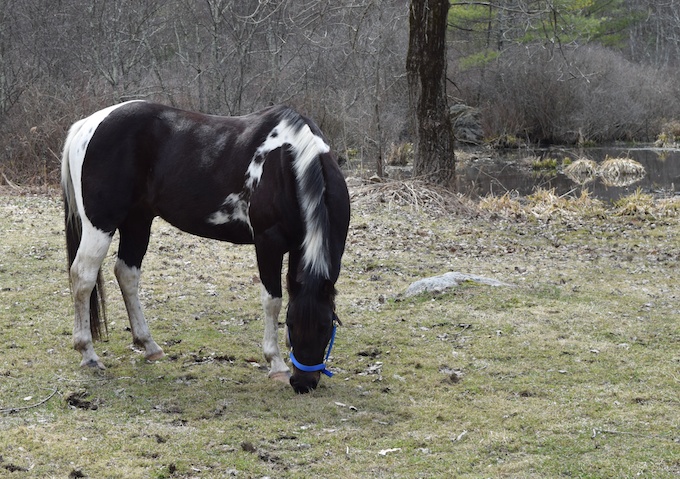
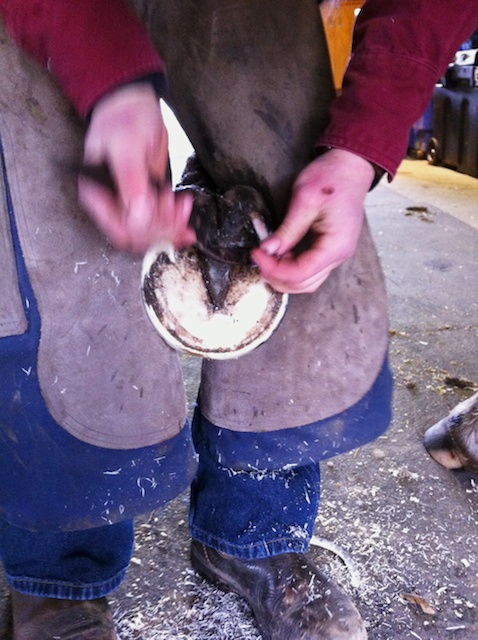

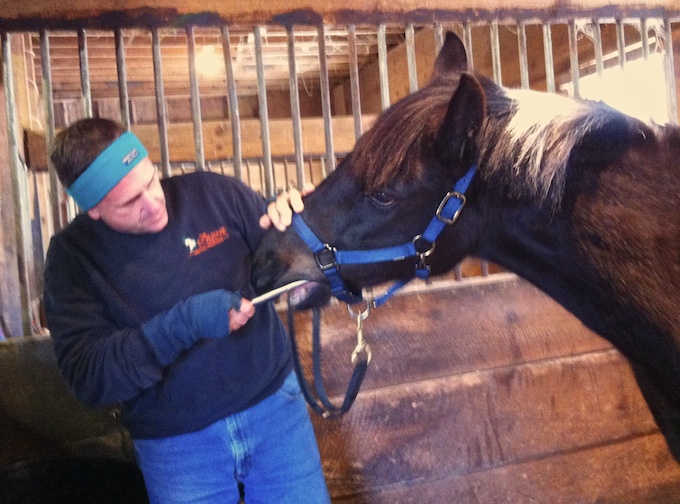
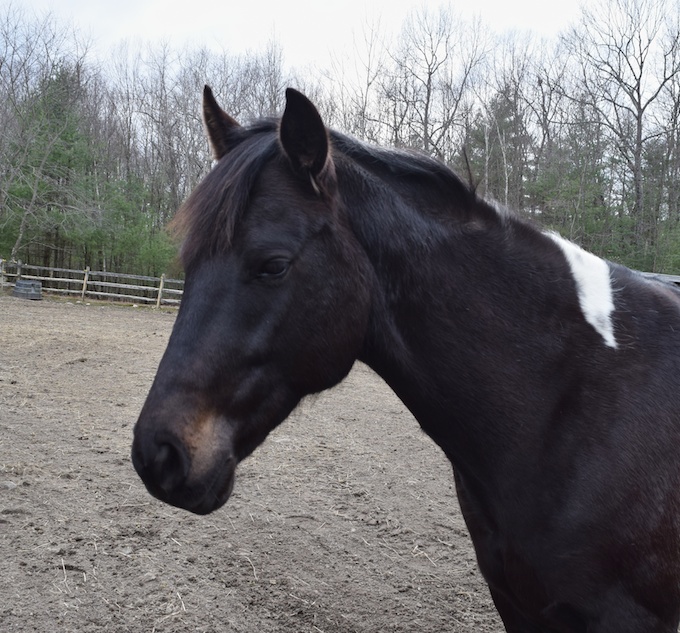
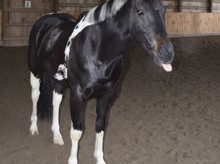
He looks so patient with the dentist. Good boy.
Terry, how do wild horses maintain trimmed hooves and smooth teeth?
It’s important to recognize that “wild” horses are actually feral domestic horses. True, some have lived generations in the wild, but they still have domestic horse health needs. Depending on where the horses are, they tend to wear down hooves on sand and rocks. My guess is that teeth wear down from grit and roughage (and also that a lot of wild horses have mouth sores!)
A wild horse travels great distances on hard ground which keeps their feet in relatively good shape. But as for their teeth, as a wild horse ages and cannot properly chew their food it is pretty much the end for them. Sad, but only the strong and young survive in the wild.
He’s a beaut.
Tonka looks so sweet and gentle. He’s a handsome horse.
Laura gave an excellent response to the commentor who asked about wild horses. I hear that so often; people questioning why our horses have to have all these shots and care when wild horses do “just fine” without. No, wild horses DIE. If they get injured, or sick from one of the several mosquito-born diseases, or foot-sore, or thin because they can’t eat properly, they become DINNER. It’s not Eden out there; it’s survival of the fittest.
Terry, you guys don’t vaccinate for Potomac? That’s another one they can get from vectors without ever leaving the farm.
No, we don’t do Potomac up here.
I filed my own horse’s hooves for most of the 36 years she was alive. your beautiful pictures make me wish I had a horse again, but I don’t miss that part. I do miss the great company, and their lovely smell.
Yes, those of us who have taken a hiatus from horses always refer to the smell when we mention what we missed the most. For those of you who don’t know – it’s not the odor of manure per se. There’s this special combination of horse hide, sweat, hay (and a touch of manure) that is, truly, wonderful.
I volunteer one weekend day a month at the Humane Society’s farm animal shelter here in Missouri. I am only allowed to do work around the poultry, goats, sheep and swine because of my lack of experience with hooved stock. But I still go into the horse barn and scratch a few noses and ears and I too LOVE the smell of the horse barn.
I too love the smell of horse & barn, it’s right up there with the smell of roses! Beautiful gentle Tonka!
I miss being around horses, but always thought the phrase “healthy as a horse” was a little ironic. What a grand looking horse you have there.
Hi, What a beautiful horse. Enjoyed the info on all that’s necessary to care for a horse properly. I have a chicken question for you. One morning last week I went out to my chicken coop to open the door and let the chickens out and found one of my hens dead on the coop floor. She had appeared completely normal the day before. No signs that I could see that anything was wrong with her. She had also laid her egg as usual. I checked on them about 9 pm and every one was on the roost and sleepy eyed. After I found her dead I checked her over and saw no signs of injury, no blood and no liquids coming out of any openings in the body. She was 9 months old, had been laying eggs for about 4 months and weighed 9 lbs. Do you have any ideas of what could have happened to her. It’s a real mystery to me. I’ll miss her, she was a real talker. Thanks for any help.
A 9 pound layer? That sounds pretty hefty, unless she was a heavy breed like a Brahma or Jersey Giant. My guess would be heart attack.
I have had a few chickens die of what I call “sudden hen death”. Use my blog search button and you’ll find some posts. I’m happy to answer off-topic questions like these privately via email (I do appreciate a “cup of coffee” in return.) I’ll email you later about this (I’m about to run out the door to help at the stable for the visit by the vet to give all of the horses their spring shots.)
Thank you so much. I would appreciate your input.
Was just reading about horse denistry. I didn’t know horses could be diagnosed with TMJ, just diagnosed with it myself. It can be a pain to wake up in the morning with facial headaches radiating out from your jaws. Though I do wonder if they put mouth guards on horses like they will with humans to prevent it. I am sure if they do the horses learn quickly to tolerate those mouth guards, if it means not waking up in the morning without facial pain !!!
My horse dentist, who is also a vet, says that horses don’t TMJ, and that all issues can be resolved with proper teeth filing.